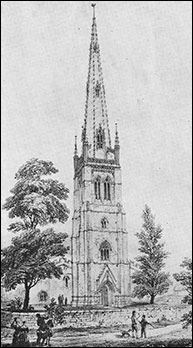|
|||||
| Article by Sue Comont based on a letter in the Northamptonshire Record Office, Ref: ZB/60/38/1 | |||||
|
Church and Chapel in Rushden, 1838
|
|||||
|
|||||
|
A poor relationship between church and chapel in Rushden in October 1838 was exposed in a letter from the relatively new curate to his patroness, Mrs Marsh, wife of the then Bishop of Peterborough, Herbert Marsh. Life for the new cleric seems to have been very hard. His letter begins “My dear Madam” and thanks her for her enquiries and deep interest in his welfare. He goes on to say that he has met with great opposition from the leaders of the dissenting bodies in the parish but he feels that he has brought about an improvement and the people are now better disposed towards him and to the Church of England. However, generally, he feels that in places where there are dissenters there are always complaints made against a clergyman – either he has a bad voice or not a good delivery or his doctrines are not gospel and he is opposed most bitterly by all if he attempts to preach what are really the doctrines of the church but which in their superior judgement are not. He then explains that the main reason why the dissenters object to him is because he has refused to allow the church bells to be tolled when dissenters are being buried in their own burying grounds. The parish has not had a resident Rector for nearly a century he adds, and nine successive curates have undertaken the care of the parish in the short space of 22 years as well as a number of unlicensed curates who have occasionally performed the duty from time to time.
Despite his troubles, however, he is proud to say that the congregation is much larger, twice the number of infants are baptised and the number of parishioners taking communion is also increased. He feels himself reassured that if his patroness could know all the circumstances connected with himself and his curacy of Rushden, his conduct would meet with her approbation, and while it does, he will endeavour to perform his duty and carry out the principles of the church, undisturbed by any remarks of those who ought to act more consistently and who in approving his conduct would condemn their own. He ends on a personal note, regretting the poor health of the Bishop and describing the deaths of his own parents. He tells of the birth of his daughter and welcomes the arrival of a gentleman named Brown at the Hall who has High Church principles and whom he expects to be a great acquisition to the parish, helping to smooth his path in the future.
|
|||||

